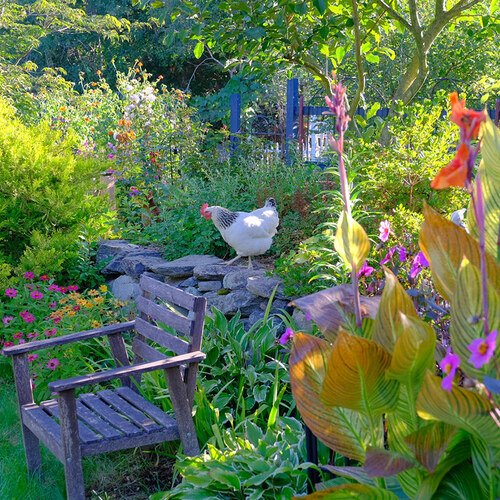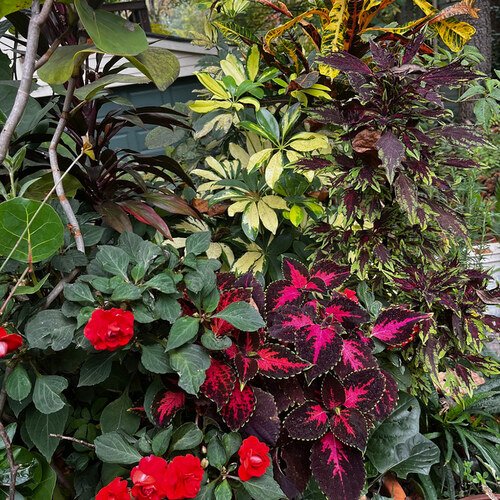
In the world of gardening,
Tingshu and Philip have around 30 chickens that play a crucial role in their garden ecosystem. These feathered friends not only provide entertainment but also contribute significantly to the health and maintenance of the garden. Tingshu mentions that the chickens produce most of the fertilizer for the gardens, helping to enrich the soil and promote plant growth. As the growing season nears its end, the chickens are invited into the garden to feast on flowers, leaves, seeds, and bugs, providing a natural form of pest control.
The chickens in Tingshu’s garden have their preferences when it comes to food. They enjoy munching on a variety of plants, including white sweet alyssum, sweet William, and Shasta daisy. Tingshu observes their eating habits closely and adjusts the garden landscape accordingly, ensuring that both the chickens and the plants thrive harmoniously.
One of the highlights of Tingshu’s garden is the presence of different chicken breeds, each with its unique characteristics and personalities. From the Yokohama rooster following a black hen to the Columbian rock hen perched on a stone retaining wall, these chickens add a charming and lively dimension to the garden. Tingshu’s granddaughter even joins in on the fun, feeding the chickens forsythia flowers and interacting with the feathered residents.
The photos shared by Tingshu capture the essence of a garden teeming with life, where humans and animals coexist in a symbiotic relationship. The chickens roam freely among the plants, contributing to the cycle of growth and regeneration in the garden. Their presence not only brings a sense of vitality but also serves as a reminder of the interconnectedness of all living beings in nature.
As we marvel at the beauty and diversity of Tingshu’s garden, we are reminded of the importance of incorporating elements of nature into our outdoor spaces. Whether it’s a flock of chickens, a pond with ducks, or a beehive with buzzing inhabitants, integrating wildlife into the garden adds depth and richness to the overall experience.
In conclusion, the
Gardening is a timeless and rewarding hobby that allows individuals to connect with nature, exercise their creativity, and enjoy the fruits of their labor. Whether you are a seasoned gardener with years of experience or a novice just starting out, there is always something new to learn and discover in the world of gardening. From cultivating a lush vegetable garden to creating a serene flower bed, each gardener brings their unique perspective and passion to their green space.
If you are a gardening enthusiast, we would love to hear from you! Share with us where you are located, how long you have been gardening, your proudest successes, lessons learned from failures, hopes for the future, favorite plants, or funny stories from your garden. Every gardener has a story to tell, and your experiences can inspire and educate others in the gardening community.
No matter where you are located, whether in a bustling city apartment with a small balcony garden or a spacious rural property with acres of land to cultivate, gardening offers a sense of connection to the natural world and a place to unwind and recharge. The joy of watching a seedling sprout, a flower bloom, or a vegetable ripen is a reminder of the beauty and resilience of nature.
For those who have been gardening for years, reflect on your journey and the evolution of your garden over time. What started as a small patch of soil may have grown into a flourishing oasis filled with a diverse array of plants and flowers. Celebrate your successes, whether it’s growing a bumper crop of tomatoes, creating a stunning floral arrangement, or attracting a variety of pollinators to your garden.
However, gardening is not without its challenges, and every gardener has experienced setbacks and failures along the way. Perhaps a sudden frost wiped out your prized roses, or a persistent pest decimated your vegetable patch. These experiences, while disheartening at the time, are valuable learning opportunities that help you become a more resilient and knowledgeable gardener.
As you look towards the future, what are your hopes and dreams for your garden? Do you envision expanding your garden beds, trying out new plant species, or incorporating sustainable gardening practices into your routine? The possibilities are endless, and the garden is a canvas for your creativity and imagination to flourish.
When it comes to favorite plants, every gardener has their preferences based on personal taste, climate, and gardening style. Some may gravitate towards vibrant annual flowers like sunflowers and zinnias, while others prefer the practicality of growing herbs and vegetables for culinary use. Native plants, heirloom varieties, and exotic blooms all have their place in the garden, adding beauty and diversity to the landscape.
And let’s not forget the funny stories that often unfold in the garden, from mischievous squirrels stealing strawberries to unexpected encounters with wildlife. Gardening is full of surprises and moments of joy that bring a smile to your face, even in the midst of a challenging gardening season.
If you have a mobile phone, consider sharing photos of your garden on social media platforms like Facebook, Instagram, or Twitter using the hashtag #FineGardening. Your photos can inspire and connect with fellow gardeners around the world, creating a virtual community of plant lovers who share a passion for all things green and growing.
In conclusion, gardening is a deeply rewarding and fulfilling activity that brings joy, beauty, and a sense of connection to the natural world. Whether you are a beginner or a seasoned gardener, your experiences, successes, failures, and dreams all contribute to the rich tapestry of the gardening community. Share your story, connect with fellow gardeners, and let your garden be a place of inspiration and growth for years to come. Happy gardening! the importance of mental health awareness and destigmatization in society.
Mental health is a crucial aspect of overall well-being that often gets overlooked or dismissed in society. There is a pervasive stigma surrounding mental health issues that prevents many individuals from seeking help and support when they need it most. This stigma can have detrimental effects on individuals, families, and communities as a whole. It is essential to raise awareness about mental health and work towards destigmatizing these issues in order to create a more supportive and understanding society.
One of the main reasons why mental health awareness is so important is because mental health issues are incredibly common. According to the World Health Organization, approximately one in four people will experience a mental health disorder at some point in their lives. This means that mental health issues are not rare or abnormal, but rather a natural part of the human experience. By raising awareness about the prevalence of mental health issues, we can help to normalize these experiences and encourage individuals to seek help without fear of judgment or discrimination.
Furthermore, mental health issues can have a profound impact on an individual’s life and well-being. Conditions such as depression, anxiety, bipolar disorder, and schizophrenia can affect a person’s thoughts, emotions, behaviors, and relationships. Without proper treatment and support, these conditions can worsen over time and lead to serious consequences such as self-harm, substance abuse, and even suicide. By raising awareness about the signs and symptoms of mental health issues, we can help individuals recognize when they may need help and encourage them to seek support from mental health professionals.
In addition to the personal impact of mental health issues, there is also a societal impact that cannot be ignored. Mental health issues can lead to decreased productivity at work, strained relationships with family and friends, and increased healthcare costs. By raising awareness about mental health and encouraging individuals to seek help, we can reduce the burden on healthcare systems, improve workplace productivity, and strengthen social connections within communities. A society that prioritizes mental health awareness is a society that is healthier, happier, and more resilient in the face of life’s challenges.
Destigmatizing mental health issues is an essential part of raising awareness and promoting a more inclusive and supportive society. The stigma surrounding mental health often stems from misconceptions and stereotypes that portray individuals with mental health issues as “crazy,” “weak,” or “dangerous.” These harmful beliefs can prevent individuals from seeking help and support, leading to feelings of shame, isolation, and hopelessness. By destigmatizing mental health issues, we can challenge these harmful beliefs and create a more compassionate and understanding society.
One of the most effective ways to destigmatize mental health issues is through education and open communication. By providing accurate information about mental health conditions and their causes, symptoms, and treatments, we can dispel myths and misconceptions that contribute to stigma. Encouraging individuals to share their own experiences with mental health can also help to break down barriers and show that mental health issues can affect anyone, regardless of age, gender, or background. By fostering open and honest conversations about mental health, we can create a more supportive and empathetic society that values mental well-being as much as physical health.
Destigmatizing mental health also requires challenging discriminatory practices and policies that perpetuate stigma and discrimination. This includes advocating for equal access to mental health services, fighting against discrimination in the workplace and healthcare settings, and promoting laws and regulations that protect the rights of individuals with mental health issues. By working together to address systemic barriers to mental health care and support, we can create a more inclusive and equitable society that values the well-being of all its members.
In conclusion, mental health awareness and destigmatization are essential components of creating a healthier and more compassionate society. By raising awareness about the prevalence and impact of mental health issues, we can encourage individuals to seek help and support when they need it most. By destigmatizing mental health issues through education, open communication, and advocacy, we can challenge harmful beliefs and create a more inclusive and supportive society that values mental well-being as much as physical health. Together, we can work towards a future where mental health is treated with the same level of care and respect as any other aspect of well-being.






